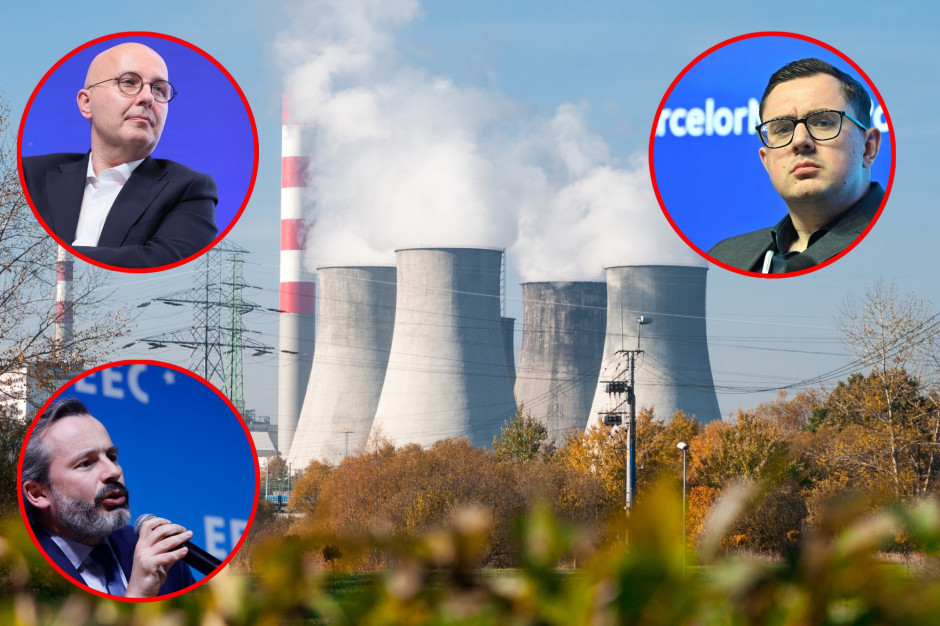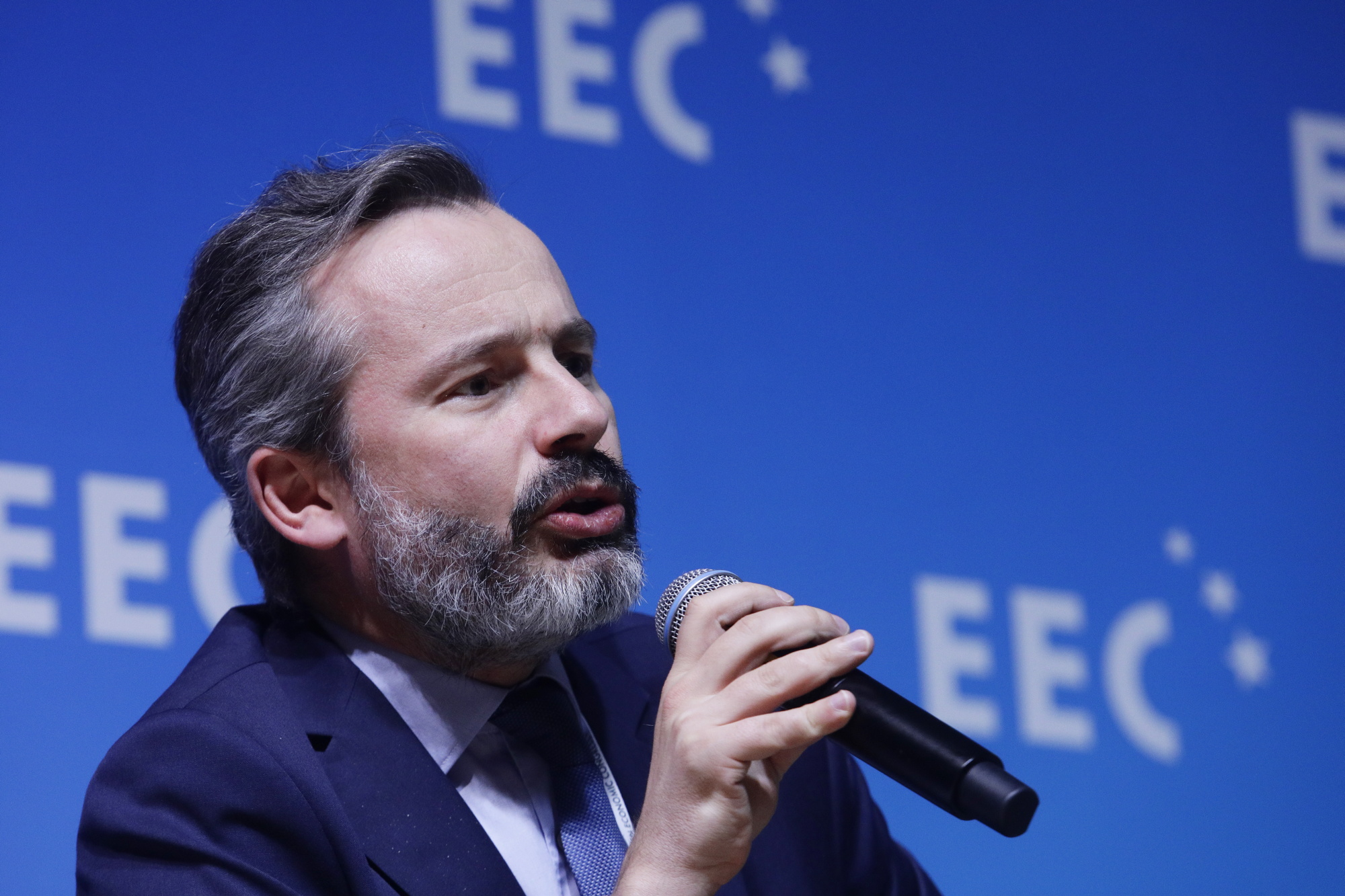- EDITIONS
- FOR ATTENDEES
- FOR THE MEDIA
- HOTELS
- CONTACT
- PO POLSKU
-
Registration - February 2024
 Registration - February 2024
Registration - February 2024

The government has yet to draft documents critical for the energy sector. We are waiting for amendments to the National Energy and Climate Plan and the Polish Nuclear Power Programme. PEP2040 is a matter of the future. Although the ministers present at the European Economic Congress insisted that a legal framework for transition has already been established, Polish energy companies how no other way but to act with no guidelines.
We are facing tremendous transitional challenges. Poland’s energy sector, still based on coal, must undergo a dramatic transformation in order to meet the ambitious climate objectives defined by the European Union.
In the meantime, the government has failed to enact any of the announced strategic documents that were supposed to – in the nearest future – pave the way for the necessary transition of Poland’s energy sector.
The amendment of the National Energy and Climate Plan till 2030, known also as “the green compass for Poland's transition”, was supposed to be presented to the European Commission by the end of June 2024. Despite numerous reprimands from Brussels, the document has not been finished yet and all that is know is a draft including two scenarios of coal abandonment. Which version will the government choose? That is still unknown.
Similarly, there still has not been a proposal for a new version of a key – if not overriding to all other legislation – document indicating direction for the development of the energy industry, namely Poland's Energy Policy till 2040 (PEP2040). The current version, adopted in 2021, has gone out of date, as the development of renewable energy sources has far exceeded the goals it had defined. The previous government failed to update PEP2040 due to the problem of specifying the role coal was supposed to play in the country’s energy policy. For the past year, Poland has been in an election cycle, a highly unhelpful circumstance.
The list of documents awaited by the Polish energy industry goes on. Still missing is a strategy for nuclear power or heat engineering.
How, in the absence of key guidelines, is Poland supposed to transform its energy industry?
Representatives of ministries working on the documents reassured the audience of the European Economic Congress insisting that there are no reasons for worry. They claimed that not only is the legal framework for the transition under development, but that significant amendments to the existing legislation are made on on an ongoing basis.
“When it comes to legislation, we had to make up for the lost time; the same holds true for strategic documents,” said Miłosz Motyka, the Deputy Minister of Climate and Environment, at the European Economic Congress.
 Miłosz Motyka (Fot. PTWP)
Miłosz Motyka (Fot. PTWP)His is the resort working to amend the National Energy and Climate Plan indicating the direction for Poland’s energy industry in the nearest future, at the same time bargaining for its green transition.
So far, we have been introduced to a project that is currently undergoing public consultation. It presents two climate and energy scenarios until 2040. The first of them, a scenario of ambitious transition called WAM (eng. With Additional Measures), assumes that by 2040 only 1% of all electricity will have been produced from coal. The second scenario, a market and technical one dubbed WEM (eng. With Existing Measures), is in compliance with a social contract between the state and miners; it assumes that Poland’s coal mines will remain operational until 2049. Each of the scenarios has its own implications on the pace of Poland’s abandonment of coal for the purpose of heat and power generation.
At the EEC, Miłosz Motyka insisted that this critical document is “almost ready”.
“We are at the stage where it is pending acceptance by decision-makers in the ministry. Both versions of the National Energy and Climate plan will be presented to the European Commission in a matter of weeks,” he argued.
Another, overriding document, PEP2040 is much longer in the making. Miłosz Motyka, speaking at the EEC, announced that work on it will have started only after the National Energy and Climate Plan has been finalized, virtually postponing it until the second half of the year.
Its update was scheduled for 2024. It was supposed to change the role of gas as a bridge fuel. However, it still has not been decided which fuel will stabilize renewable energy sources by the time power generated from Poland's first nuclear power plant is fed to the grid.
A document that is essential for the development of Poland's nuclear power plant, the Polish Nuclear Power Programme, has not been adopted yet either. The Ministry of Industry of the Republic of Poland is currently working on it. Its main assumptions were presented in March. It was when the final version of the document had been expected. It did not happen due to reservations expressed about it by the Supreme Audit Office. Initially, it was believed that two weeks was enough to dispel the doubt of the Supreme Audit Office. Two weeks turned into a month, and the updated version of the Polish Nuclear Power Programme was nowhere in sight.
“The document is virtually finished, we are putting the finishing touches to it. They concern the construction of a second nuclear power plant, a competitive model for selecting the supplier of technology and the general contractor, as well as the surrounding of the site. It will be ready in just a few days. We do not expect a revolution. Most importantly, our work on the document has no effect on the construction of Poland’s first nuclear power plant. It has already started,” assured Paweł Gajda, the director of Nuclear Power Department at the Ministry of Industry of the Republic of Poland, at the European Economic Congress.
 Paweł Gajda (Fot. PTWP)
Paweł Gajda (Fot. PTWP)He highlighted that a framework for over a decade long development of nuclear power should be carefully prepared rather than published in haste. Nonetheless, it is a serious matter. Although the construction of Poland's first nuclear power plant has already started and a geological survey is currently done in Choczów, there are companies willing to build Poland’s second nuclear power station that are waiting for the Polish Nuclear Power Programme. The update of the Programme would provide for a different way of selecting the supplier of technology and the general contractor, as well as a different way of financing such a large project. Choosing a location for Poland’s second nuclear power plant is out of question before that happens.
Energy groups are waiting for conclusions and decisions of the government on the separation of coal assets. It is worth reminding that in 2023 it was agreed that State Treasury would acquire the coal assets of PGE, Tauron, Enea and Energa with a purpose of establishing the National Energy Security Agency (pol. NABE). In theory, its establishment would allow energy groups to concentrate on the development of low- and zero-emission sources of energy, which in turn would accelerate Poland's energy transition. However, in 2023 the Senate, the upper house of the Polish parliament, rejected a bill on financial guarantees for the National Energy Security Agency, and the project was eventually terminated last year by the government headed by Donald Tusk.
Still, the separation of coal assets offers energy groups an opportunity to tap into new sources of financing for transformational investments, especially from institutions that no longer finance coal-related investments.
Representatives of the government promise that decisions are just around the corner.
The deputy minister of state assets, Robert Kropiwnicki, said at the European Economic Congress that the ministry is planning to conclude the analysis of data on the separation of coal assets a few months from now.
 Robert Kropiwnicki (Fot. PTWP)
Robert Kropiwnicki (Fot. PTWP)“We were very optimistic about the National Energy Security Agency. The situation we are dealing with today is radically different. At the moment we are examining the data on which the concept of the National Energy Security Agency was founded. In a matter of two or three months we expect to have a full picture of the situation,” explained the deputy minister of state assets at the European Economic Congress.
Nevertheless, representatives of the government highlighted the fact that, irrespective of the progress on strategic plans, Poland’s transition is already underway.
“It is a landmark year, as we are launching processes that may result in more affordable, cleaner and safer energy for the country's economy. To us, facts are of the essence. What matters is that we have started the construction of nuclear power plants, offshore wind farms; there is a lot going on in the field of onshore renewable energy sources. We have allocated gigantic amounts of cash for investments in distribution that are expected to facilitate the distribution of energy from dispersed energy sources,” enumerated deputy minister of state assets Robert Kropiwnicki.
“Poland's transition is happening on many levels, effected by enterprises and citizens alike. So far, legislation has failed to catch up with the market. The law on energy has not been amended, neither has the law on grid connections or the expansion of cable pooling. We are currently working on new legislation, engaging in dialogue with entrepreneurs so that they can have an impact on the new law,” said Miłosz Motyka at the EEC.
He did admit there still has not been a final version of the National Energy and Climate Plan, but the government has introduced a dozen amendments into the legislation critical from the perspective of the industry. Among them is the act on the postponement of new tariffs which allows entities operating on the market flexibility when energy prices decrease or increase. Another examples is the notorious 10H bill that has been under development since the end of June 2024.
Speaking at the EEC, Miłosz Motyka argued that the 10H bill will have been brought before Parliament over the next few weeks. Come summer, it will be pending approval of the president. Not only might the government succeed in shortening the distance of wind turbines from residential buildings, but it may also shorten the time required to complete a project.
“We are drafting stable legislation for the energy industry. The reason it has taken so long is that we want to avoid the necessity of introducing absurd amendments that would turn projects on their heads. There will be no more endless political negotiations preventing investors and entrepreneurs from making long-term plans,” concluded deputy minister Motyka at the European Economic Congress.
As ministers are designing schedules for drafting legislation critical from the perspective of the energy sector, one cannot resist the impression that any relevant decision depends on the election calendar. The first round of presidential election in Poland has been scheduled for May 18th.

You watching archival version of European Economic Congress
What you can do:
Go to the current edition page or Continue browsing